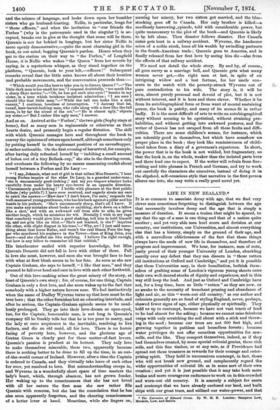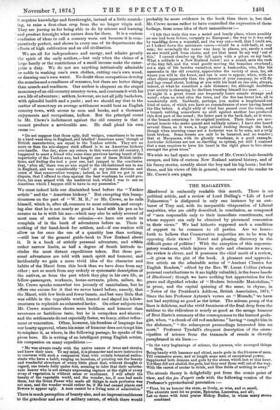LIFE IN NEW ZEALAND.*
IT is so common to associate decay with age, that we find very clever men sometimes forgetting to distinguish between the age that necessarily involves decay and the age that is simply a measure of duration. It seems a truism that might be spared, to say that the age of a man is one thing and that of a nation quite another ; and yet very able men hurl scorn and derision at our country, our institutions, our Universities, and almost everything else that has a history, simply on the ground of their age, and with a marvellous obliviousness of the fact that these things always have the seeds of new life in themselves, and therefore of progress and improvement. We hear, for instance, men of note, justly proud of their younger University of London, chuckling merrily over any defect that they can discern in "those rotten old institutions at Oxford and Cambridge," and yet it is possible that these Universities may, in their humiliation, bethink them- selves of grafting some of London's vigorous young shoots onto their own well-inured stocks of dignity and experience, and in this way still keep the lead. And just as Oxford and Cambridge have not, for a long time, been so little " rotten " as they are now, or so awake to the necessity of trenchant pruning and abundance of light and air, so this "worn-out old country," as our author and colonists generally are so fond of styling England, never, perhaps, showed fewer signs of age, either physically or spiritually. They hold us up to contempt, because we have not vast tracts of land to be had almost for the asking ; because we cannot raise fabulous crops with only scratching the soil about with a stick and throw- ing in the seed ; because our frees are not 300 feet high, and growing together in pathless and boundless forests ; because water privileges do not offer countless opportunities for saw- mills, and the like. They comport themselves, indeed, as if they had themselves created, by some special colonial genius, these rich soils, and this fine timber, or at any rate, as if Providence had spread out these treasures as rewards for their courage and enter- prising spirit. They hold in unconscious contempt, in fact, those who will not break new ground, and complacently regard the wider opportunities of colonial life as in some sort of their own creation ; and yet it is just possible that it may take both more brains and more courageous endurance to work on in this crowded and worn-out old country. It is scarcely a subject for -scorn and contempt that we have already enclosed our land, and built ships with our great trees, and utilised our water-power, and that • The Narrallre of Edward Crewe. By W. N. B. London: Sampson Low; Marston, Low, and Searle. it requires knowledge and forethought, instead of a little scratch- ing, to raise a first-class crop from the no longer virgin soil. They are jeering us for being able to do by science and learning = and prudent foresight what nature does for them. It is a curious confusion of ideas to call a country worn out because it is com- paratively perfect, and shows in every one of its departments the effects of high cultivation and an old civilisation.
We are all for independence and energy, and admire greatly the spirit of the early settlers,—but only when the claims of a large family or the restrictions of a small income make the enter- prise a duty. We do not see anything intrinsically admirable or noble in washing one's own clothes, cutting one's own wood, or drawing one's own water. No doubt these occupations develop the muscles and a readiness of resource, but there are better things than muscle and readiness. Our author is eloquent on the stupid monotony of an old-country country-town, and contrasts it with his own life of adventure ; settlers, however, are not all jolly bachelors, ' with splendid health and a yacht ; and we should say that in the matter of monotony an average settlement would beat an English country town, with access to men and books, and a thousand enjoyments and occupations, hollow. But the principal count in Mr. Crewe's indictment against the old country is that it cannot produce a serviceable axe. He shall plead his own cause :— "Do not suppose that those ugly, dull wedges, sometimes to be seen in a hard-ware shop in England, and labelled American axes,' though of British manufacture, are equal to the Yankee article. They are no more so than the mis-shapen stick affixed is to an American hickory axe-handle. One day, since my return to this worn-out old country, I happened to meet a friend who some time previous having heard of the superiority of the Yankee axe, had bought one Of these British imita- tions, and finding the tool a poor one, had jumped to the conclusion that, after all,' there was no axe equal to the old-fashioned one in use in England, and was considerably 'riled' at my intense derision and scorn of that conservative weapon; indeed, so hot did we get in our dispute, that I offered to chop against the best woodman he could pro- duce, his man -armed with the mediaeval tool, whilst I was to use an American which I happen still to have in my possession."
We must indeed hide our diminished head before the "Yankee article" and the "American hickory." But excepting this bump- . tiousness on the part of "W. M. B.," or Mr. Crewe, as he calls himself, which is, after all, common to most colonists, and except- ing also that he is not nearly so good a hand with his pen as he assures us he is with his axe—which may also be safely averred of most men of action in the colonies—we have not much to complain of in the book of adventures before us. There is • nothing of the band-book for settlers, and—if our readers will allow us for once the use of a quantity less than nothing, —still less of the general guide-book to New Zealand about it. It is a book of strictly, personal adventure, and within rather narrow limits, as half a degree of South latitude in- cludes the most distant expeditions taken. But these per- sonal adventures are told with much spirit and humour, and incidentally we gain a more vivid idea of the character and habits of the Maori from this book than we have done from any other ; not so much from any orderly or systematic description of the natives, as from the part which they play in his own life, as fellow-passengers, workmen, house-servants, pilots, sailors, &c. Mr. Crewe speaks somewhat too jocosely of cannibalism, but he offers one excuse for it that we never heard before, namely, that the Maori, with few birds and fewer beasts, and but very little that was edible in the vegetable world, hunted and slayed his felloW- creatures to replenish an exhausted larder. On other subjects too Mr. Crewe sometimes shows more boldness and humour than reverence or fastidious taste, but he is outspoken and sincere ; , and the settlements do not especially foster, we fancy, either refine- ment or veneration. Often, however, his freedom of language has our hearty approval, where his sense of humour does not tempt him to misplace it, as where, in the following passage, he speaks of the pious bore. He is writing of an intelligent young English settler, his companion on many expeditions :— " He was always ready with the native names of trees and shrubs, and knew their uses. To my mind, it is pleasanter and more instructive to converge with such a companion- than with certain botanical enthu- siasts who have a habit, verging on boredom, of pointing out the beauty and wonderful structure of every little plant that, without thought or regard, one treads daily under foot, seeming to infer that their unfortu- nate hearer who is not always expressing rapture at the sight of every scrap of vegetation is without sense or sentiment. I will admit the beauty of the vegetable world, and the wonder, too, if man had made them, but the Great Power who made all things in such profusion was not man, and the wonder would rather be, if He had caused plants and flowers to appear ugly. A man cannot be a living note of admiration."
There is much perception of beauty also, and an impressionableness to the grandeur and awe of solitary nature, of which there would probably be more evidence in the book than there is, but that Mr. Crewe seems rather to have controlled the expression of these feelings, from some idea of their unmanliness :—
" I felt that truly this was a weird and lonely place, where possibly no one had been before, certainly no European ; the way to it was only by tumbling down a waterfall, and the way out—well, that I could see, as I looked down the miniature canon—would be a cold-bath, at any rate ; for seemingly the water was deep in places, yet, surely a road no one would pick from choice, and yet that must be my way'out of this.' I cannot clamber up the fall again with a pikau on my back. What a solitude is a New Zealand forest not a sound, save the rush of the tiny fall, and the wind gently moving the branches overhead;. not a sign of life besides ourselves, save a bush-robin, who, like his namesake in the old country, appreciates the society of man, for, sit where you will in the forest, and one is sure to appear, when, with no- other object apparently than the pleasure of your company, he will fly and bop round about, looking at you with his head on one side, always, indeed, at what he considers a safe distance; for, although doubtless
your society is charming, be declines trusting himself too near At night in a great forest one frequently hears sounds strange and weird ; when no wind stirs the trees, and the fire has burnt low, all is wonderfully still. Suddenly, perhaps, you notice a lengthened-out kind of noise, of which you have no remembrance of ever having heard the like before. A slight eddy of wind has passed over the trees, and a branch rubbing somewhere up aloft against another has produced this first part of the sound ; the latter part is the back-lash, as it were, of the branch returning to its original position. Then there are noc- turnal insects who make quaint and unlikely noises ; I have also heard several times, as it were, a huge animal rushing through the bush, though when morning came not a footprint was to be seen, not a twig fresh broken. Some forests are said to be haunted, and no wonder;. that at Marquesas, with its ghostly woodman, is a good example. Auricular delusions are not so startling as optical, yet still I contend that a man requires to have his heart in the right place to live alone amongst the great trees."
We wish we had space to quote some of Mr. Crewe's hair-breadth escapes, and bits of curious New Zealand natural history, and of his funny stories, notably about the boy and his big boots ; but for these, and his views of life in general, we must refer the reader to Mr. Crewe's own pages.



































 Previous page
Previous page